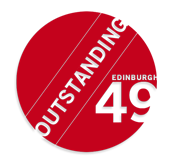“Quite possibly the best presentation of the nuances of race relations from the unjustly-treated point of view one can experience today.”
Editorial Rating: 5 Stars: Outstanding
Given the many difficulties faced by millions of people around the world in our current climate, every civil rights-focused spotlight is worthy of attention. Apphia Campbell’s Woke, however, is not just another “worthy” civil rights-focused show decrying injustice for being injustice — it cuts deeply into the structures, limits, hypocrisies, and evils that allow racism, injustice, disorder, and oppression to continue and continue and continue. If you have ever claimed or had the urge to claim that the current racial climate is “not that bad,” please let Woke wake you up.
These issues are never simple. Many pop culture statements have garnered great praise, and some rightful ire, for presenting race relations too simply. From Zootopia/Zootropolis to Crash, mainstream outlets seem to eat up stories that are easy to swallow, that present problems as apparently easy to fix. Campbell’s play soars above simplicity by presenting the sometimes charming, sometimes harrowing stories of two black women, one speaking from 2014 onwards, the other speaking from the Black Panther Party of the seventies. She masters not only the nuances of storytelling but of stagecraft as well, as lighting, sound effects, props, and choreography are all of the highest creative quality.
The audio introduction repaints the mental pictures of the shooting of Michael Brown in Ferguson, Missouri in August 2014, and from there Campbell segues into an absorbing rendition of Bessie Smith’s “St. Louis Blues.” The transition, spanning decades yet recalling the same geographical location, Missouri, offers foreshadowing for the overarching structure and central observation of the show — just how far have we come since the ‘Civil Rights Era?’ According to Campbell, certainly not far enough.
What is most striking about the plotting of Woke, is that both characters Campbell breathes life into are not only vividly characterised, with engrossing nuances (credit to director Caitlin Skinner) but also experience a noticeably, tragically similar hardening. Ambrosia, who speaks of 2014, initially believes in the righteousness of the police and questions the legitimacy of the Black Lives Matter movement in her Washington University classes. Yet over time, she experiences so many abusive, prejudiced cruelties at the hands of police officers and the law writ large that she, and the audience, have no choice but to accept that society still fails to treat people like her as equal citizens. The pacing of these developments is gradual, yet her hellish experiences continue and worsen with a palpable, sickening sense of inevitability. Campbell’s writing does well to put the audience in the shoes of Black citizens’ everyday anxieties, from questioning one’s trust in the police to fearing for one’s safety where other citizens would never.
The other character Campbell focuses on is a well-known figure, Assata Shakur, who was convicted of the murder of a state trooper in 1973, and fled to Cuba after escaping prison. The legitimacy of this conviction is dismantled with brilliant progression, as she establishes Shakur’s positivity, righteousness, and honour, before displaying her growing terror as establishment forces seek to slander and imprison her.
The genius of Woke is in its building unease, the sure feeling that something terrible is at play. The steps of injustice are on full display, so the audience can understand it is never just one slight or careless comment that perpetuates racism, but a seemingly impenetrable societal structure. This approach encapsulates the fear at the heart of being “woke” — defined, in my opinion, as learning about, following and speaking out on the injustices faced by disenfranchised members of society. The fear is that one might uncover too much to comfortably continue as a member of society anymore; that understanding the truth of the horrors that white-dominated civilization has inflicted on non-white individuals, it will be too hard to ignore their lasting effects.
In my opinion, Campbell’s production is quite possibly the best presentation of the nuances of race relations from the unjustly-treated point of view one can experience today. Theatrically, it is worth a run of standing ovations. Thematically, it is a revelation. Societally, it is required viewing. Ultimately, Woke is a statement that deserves to be lauded in every way.
Reviewer: Nathaniel Brimmer-Beller



You must be logged in to post a comment.